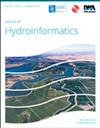Hydrovars:收集水文变量的 R 工具
IF 2.2
3区 工程技术
Q3 COMPUTER SCIENCE, INTERDISCIPLINARY APPLICATIONS
引用次数: 0
摘要
水文模型可以从软校准中获益,软校准是在进行硬校准的同时或之前证明水文变量模拟正确的过程。软校准可降低获得统计上准确但不现实的模型的概率。不过,这需要软数据,而这些数据往往很难获取或无法获得。本研究介绍了一种 R 工具 HydRoVars,该工具旨在帮助估算可在软校准程序中实施的数据。它可以估算一个或多个流域的两个关键水文指数(径流系数和基流指数)以及流域尺度上的天气相关变量。径流系数根据降水和溪流数据集自动计算。地下水的贡献是通过考虑水文地质特性的基流过滤器进行半自动估算的。将软校准纳入校准程序将使建模人员受益匪浅,该工具可能有助于估算建模区域内的相关水文变量。该工具已在位于不同地质区域的塔霍河流域(西班牙)的 19 个子流域进行了测试。在测试案例中,我们展示了该工具在改进模型表现和了解流域水文情况方面的实用性。本文章由计算机程序翻译,如有差异,请以英文原文为准。
Hydrovars: an R tool to collect hydrological variables
Hydrological models can benefit from soft calibration, a process by which the proper simulation of hydrological variables is proved while or before addressing hard calibration. Soft calibration reduces the probability of obtaining a statistically accurate but unrealistic model. However, it requires soft data, which is often hard to acquire or unavailable. This work presents HydRoVars, an R tool developed to facilitate the estimation of data which can be implemented in a soft calibration procedure. It allows to estimate two key hydrological indices (the runoff coefficient and the baseflow index) and weather-related variables at the catchment scale for one or numerous basins. The runoff coefficient is calculated automatically from precipitation and streamflow datasets. Groundwater contribution is estimated through a semi-automatic process based on a baseflow filter which considers hydrogeological properties. Modellers would benefit from incorporating soft calibration in their calibration procedures, and this tool might help to estimate these relevant hydrological variables in their modelled area. The tool has been tested in 19 subbasins of the Tagus River basin (Spain) located in different geological regions. In the test cases, we demonstrate the usefulness of this tool to improve the model representation and gain an understanding of the catchments' hydrology.
求助全文
通过发布文献求助,成功后即可免费获取论文全文。
去求助
来源期刊

Journal of Hydroinformatics
工程技术-工程:土木
CiteScore
4.80
自引率
3.70%
发文量
59
审稿时长
3 months
期刊介绍:
Journal of Hydroinformatics is a peer-reviewed journal devoted to the application of information technology in the widest sense to problems of the aquatic environment. It promotes Hydroinformatics as a cross-disciplinary field of study, combining technological, human-sociological and more general environmental interests, including an ethical perspective.
 求助内容:
求助内容: 应助结果提醒方式:
应助结果提醒方式:


